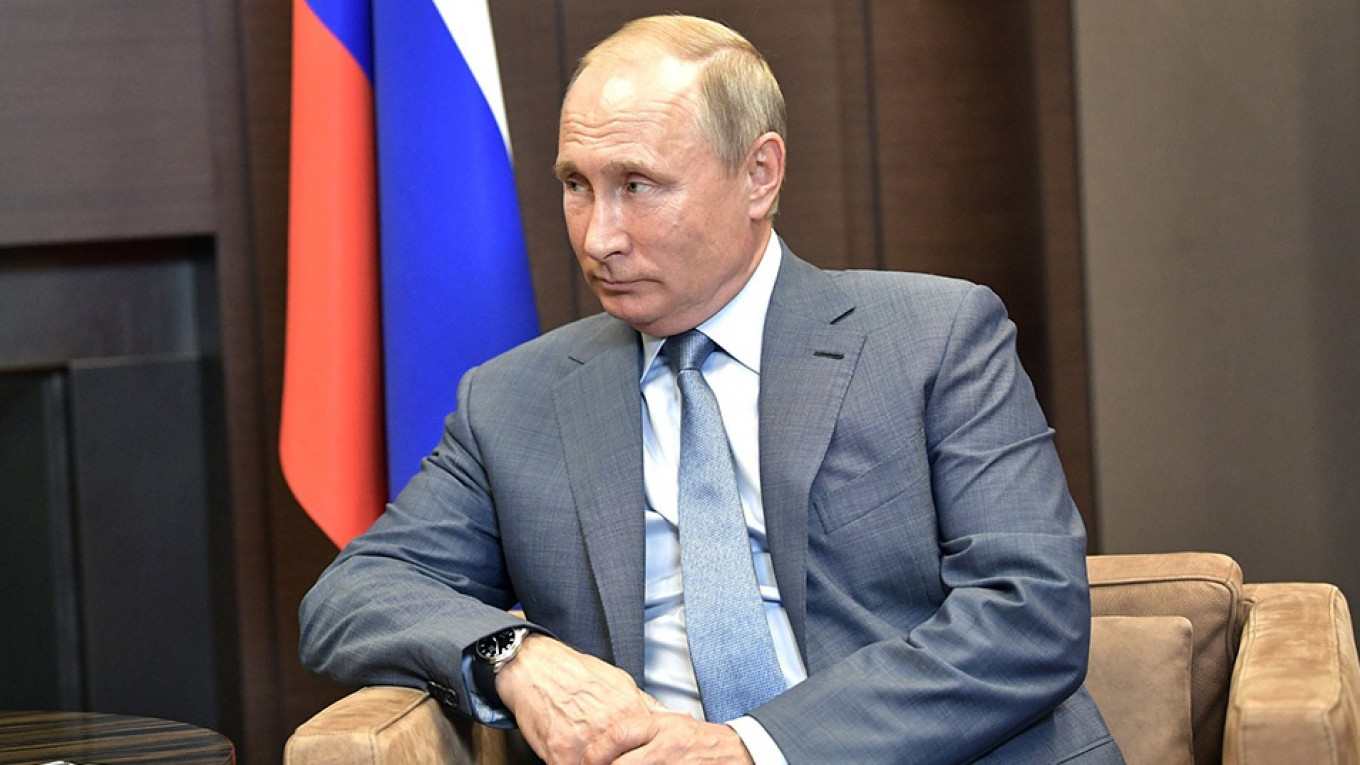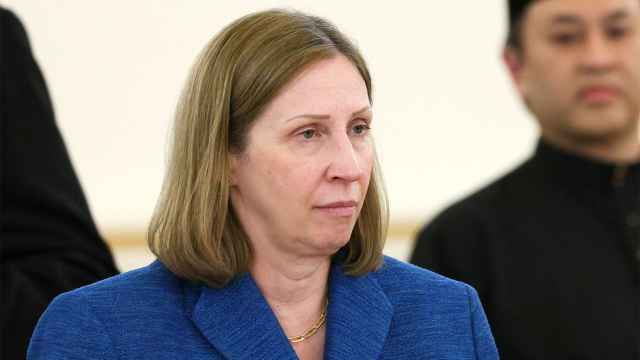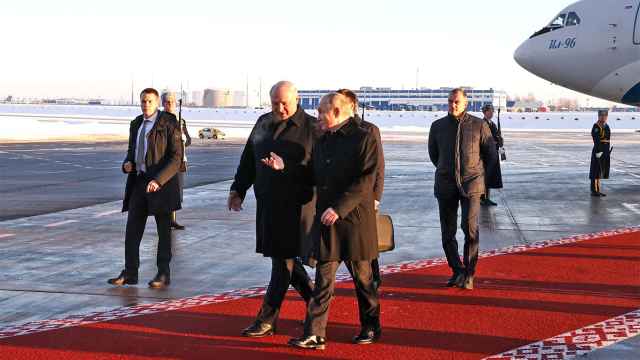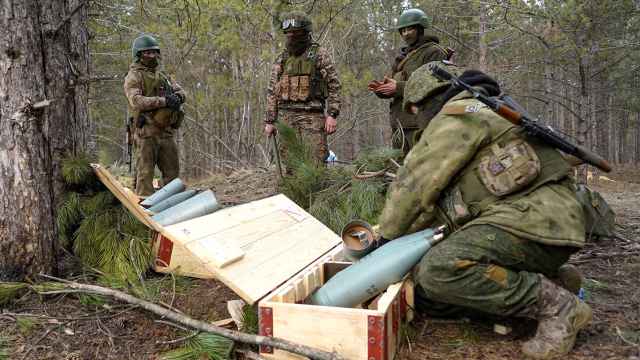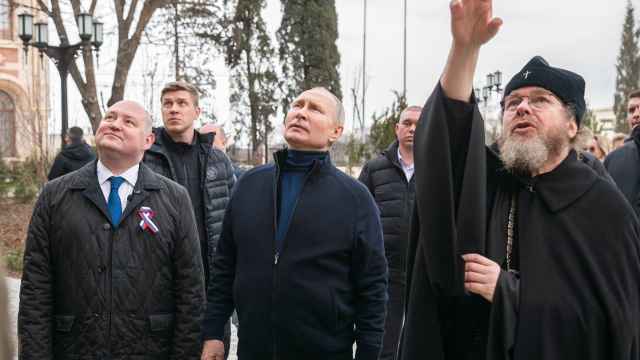In Russia, long reigns have been known to end badly. After the 50-year rule of Ivan the Terrible, for example, the nation descended into a period of political infighting, social upheaval and economic strife known as the “Time of Troubles.”
Can Vladimir Putin, who will have ruled 24 years when his last constitutional term ends in 2024, avoid a similar fate?
This question has preoccupied Olga Kryshtanovskaya, a sociologist who has spent the last few decades focused on — and sometimes participating in — the Russian political elite. An early critic of the Putin regime, she later became an active member of the Kremlin-loyal United Russia party. She’s now back in academia as head of the Elite Studies Center at the State University of Management, seeking to reconcile her insider’s experience with the pursuit of objective analysis.
Kryshtanovskaya sees many dangers ahead, including the possibility of a new time of troubles as parts of the elite turn against Putin. As a result, she doesn’t expect him to relinquish power anytime soon. And whatever happens, she’s sure that elections will play little to no role. Here’s an edited version of our conversation:
Mark Whitehouse: If Putin doesn’t change the constitution, then in 2024 Russia will need a new leader. Yet the country hasn’t had a truly contested election since 1996, and it’s not clear that it even has a legitimate mechanism for the transfer of power. So who will decide what comes after Putin, and how?
Olga Kryshtanovskaya: It’s pretty widely understood that Russia is run by clans. Their leaders include Igor Sechin [chairman and chief executive officer of state-controlled oil company Rosneft], Sergei Chemezov [general director of Rostec, a state corporation that deals in military and other technologies], Sergei Ivanov [former defense minister], Nikolai Patrushev [former director of the Federal Security Service, the successor agency to the KGB]. There’s no institution that gets together and votes, but somehow they interact and Putin makes the final decisions, keeping in mind the interests of the clans.
Within this elite, Putin is considered to be an incredibly smart person and an excellent judge of people. So he’ll play the central role in the transfer of power. Each clan will offer a list of a few candidates to be Putin’s successor, and Putin will make the final choice. But he can’t just leave it at that. The successor will be part of a system, which is more important than the person. So I also expect some changes in the system — that is, in the constitution.
Right now, Putin is at the top of the power structure. He can’t actually take part in the next election. But where will he go? He needs a position. So I think one will be created — a new entity, or a modified entity, that will become very important when Putin occupies it. In this way, he can make way for a new president, and remain legitimate and respectable, while maintaining a certain amount of power.
I think the new entity can be the State Council [an advisory council that Putin set up in 2000, based on similar councils used in Soviet and prerevolutionary times]. Its functions include acting as arbiter among the institutions of power. That’s perfect. Putin can be the arbiter. He can monitor, influence and even control the new president.
There’s already some evidence of this happening. The president’s administration has created a new department for the State Council. It’s very strange — there aren’t any such departments for other government organs, such as the State Duma. But there it is.
MW: Is there any analogue of the State Council in other countries?
OK: It’s somewhat similar to China’s Central Military Commission under Deng Xiaoping. People from Russia’s security services [Putin was a KGB officer] are big fans of China. A lot of them think that if Yuri Andropov [general secretary of the Communist Party from 1982 to 1984] had stayed in power, Russia would have followed the Chinese path. All the levers of power would have remained in the party’s hands, and private business would have been allowed to develop only in certain parts of the economy. So it’s the Deng Xiaoping model.
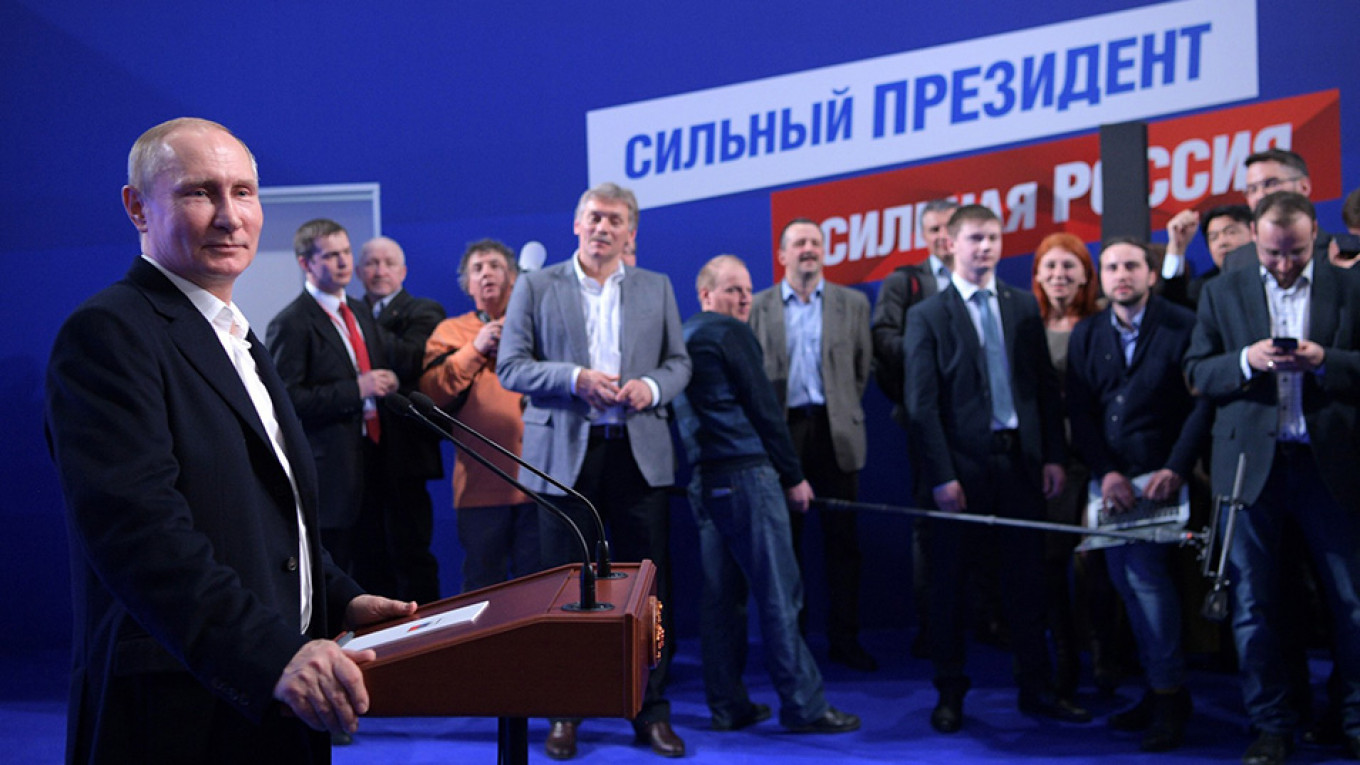
MW: You recently gave a presentation at Moscow State University in which you noted that the clans themselves are undergoing a sort of generational shift. Can you elaborate?
OK: In the ruling elite, you have people born in the ’40s, ’50s, ’60s, ’70s and ’80s. When Putin came to power, most of his team was from the ’50s. Now it’s mostly people from the ’60s. But looking ahead to the 2024 succession, Putin has no choice but to bet on people from the ’70s. He needs someone who will bring new energy.
Putin recognized long ago that his old guard would have to exit gradually. They occupied all the key positions in government: If they all left at once, it would be a disaster. He convinced them to occupy positions close to power and gradually make way for the next generation. I think he actually gave them an assignment to attract new cadres. It’s not a random process. To maintain the system, the people have to change.
So now all these new people are appearing in government posts — governors, ministers and so on — and they’re all controlled by the older patriarchs. They include Alexei Dyumin, the governor of Tula Region; Andrei Vorobyov, the governor of the Moscow Region; Gleb Nikitin, acting governor of Nizhny Novgorod region.
Gradually they’ll come into their own — they’re not amoebas, they’re politicians. For the time being, though, they have to be ‘technocrats.’ If they manage to achieve something in their region or ministry, then they might join the ranks of potential candidates. They have to fix roads, build buildings and stay quiet. If they behave, then maybe they have a future.
But they’re in positions of power, they have resources. They’re building teams, and gradually their political interests will diverge from those of their patriarchs. They’ll want to move up the ladder of power. Sechin can’t be president, but his protégé can. As 2024 approaches, these different interests will lead to conflicts within the old ruling elite. If that coincides with rising dissatisfaction among the people — say, because they’re unhappy about pension reform or about the worsening economy — then we have a dangerous situation. The process could get out of control.
MW: How do you imagine that playing out?
OK: I looked at it using game theory, and concluded that the elite is likely to betray Putin. As soon as Putin indicates which group's candidate he prefers, the optimal strategy for the other groups is to undermine that candidate — because if he wins, they stand to lose everything.
The clans can’t all be comfortable with any single candidate. There’s no politburo, no place for them to sit down and make a collective decision. It’s like the petals of a daisy. They all have a connection to Putin, but they have no connection to one another.
MW: This looks like a game with a bad equilibrium. The optimal strategies for the individual players are not aligned with the common good.
OK: Yes, and I wonder whether Putin understands this. I think he does. I think it’s his main concern. So I think he will try to create a system that won’t allow his successor to act too freely, but also won’t allow the people to revolt while the successor is still weak. Putin needs to cede power gradually.
MW: Will elections play any role in this process?
OK: In our system, there are always elections, but the real choice is made by a small group of people, not 140 million.
MW: Won’t the lack of choice make people angry enough to go out in the streets and protest, like they did in 2011 and 2012?
OK: It might, so Putin is taking preventative measures. He was trained in the state security services, which have very specific methods for dealing with opposition.
There’s a pyramid of protest. At the bottom, you have millions of pensioners and so on, and at the top you have leaders such as Alexei Navalny. Below the leaders, you have the people who organize and finance the opposition, and you have a limited number of fighters who are willing to tangle with the police. Between them and the pensioners, there’s a big gap — which, if it closed, would be very dangerous.
Here’s how you handle this. Create rifts among the leaders. Charge them with corruption, discredit them, destroy them one by one. Disable the intellectual and financial center, for example by cutting off non-governmental organizations from foreign sources of financing. If a Russian oligarch is providing financing, file criminal charges related to his business dealings. Frighten or neutralize the fighters with more criminal charges.
What the KGB methods don’t do is address the source of the dissatisfaction. They don’t care why the people are protesting. They don’t work with reasons, they work with specific individuals.
MW: Is that a weakness?
OK: From a sociologist’s perspective, yes. But from the perspective of an acting politician, it’s very effective.
There are complicating factors. Western public opinion. Free media. They might explain to those pensioners that Navalny isn’t actually the corrupt one. So you have to curtail freedom of speech and control the internet, too. Navalny’s popularity came as a surprise to the president’s administration. They were slow to wake up to the power of social networks. They won’t make that mistake again.
It’s amazing how successful the approach has been. In 2011, the protest movement seemed invincible. But by the end of 2012 it was disoriented and weak. And in 2014, we had the patriotic counterrevolution, with the annexing of Crimea and all that.
MW: What kind of person can qualify to become Putin’s successor? What are the job requirements?
OK: He has to be Russian, with a Russian last name. He can’t be too bold or brash, otherwise the opposition within the elite will fear and destroy him. He has to have decent relations with all the patriarchs, with the old guard. In wielding power, he has to strike a delicate balance. If he’s too harsh, he can galvanize the opposition. But if he’s too weak, the opposition might see him as an easy target.
It would be good if he were smart, but that’s not necessary. Russian politics favors a very specific kind of intelligence, a sort of Byzantine cunning. You’re valued if you know how to manipulate, how to play a subtle game. It’s also good to be wealthy, so you have the resources to defend yourself.
MW: How can Putin be sure that his successor won’t turn against him?
OK: This won’t be merely a gentlemen’s agreement. It’s a mistake to think that when Medvedev took over the presidency in 2008, Putin simply trusted him to return it in 2012. For Medvedev, violating the contract wasn’t an option. He would have suffered, his family would have suffered.
Putin will create conditions that make betrayal impossible. For example, the constitutional reform could give control of the military to the head of the State Council — to Putin, that is. In this way, he would officially weaken the post of president, leaving the most powerful position for himself.
The old elite might support Putin in this, because they’re interested in preserving the status quo as much as possible. So for some time there could be two centers of power. Only later would Putin step down, making way for a new era.
But then there’s another danger. If Putin doesn’t allow a successor to truly gain power, the system will still depend too much on him. This is unstable, as we saw with Brezhnev and Stalin. Long periods of rule tend to end in times of trouble.
Mark Whitehouse writes editorials on global economics and finance for Bloomberg Opinion. He was founding managing editor of Vedomosti, a Russian-language business daily. The views and opinions expressed in opinion pieces do not necessarily reflect the position of The Moscow Times.
A Message from The Moscow Times:
Dear readers,
We are facing unprecedented challenges. Russia's Prosecutor General's Office has designated The Moscow Times as an "undesirable" organization, criminalizing our work and putting our staff at risk of prosecution. This follows our earlier unjust labeling as a "foreign agent."
These actions are direct attempts to silence independent journalism in Russia. The authorities claim our work "discredits the decisions of the Russian leadership." We see things differently: we strive to provide accurate, unbiased reporting on Russia.
We, the journalists of The Moscow Times, refuse to be silenced. But to continue our work, we need your help.
Your support, no matter how small, makes a world of difference. If you can, please support us monthly starting from just $2. It's quick to set up, and every contribution makes a significant impact.
By supporting The Moscow Times, you're defending open, independent journalism in the face of repression. Thank you for standing with us.
Remind me later.



